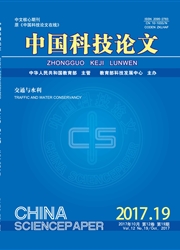

 中文摘要:
中文摘要:
硫酸钠作为腐蚀性场地的一种常见物质,对水泥加固土的形成有着很大的影响.通过室内无侧限抗压强度试验,探讨了不同含量的硫酸钠对水泥土强度的影响规律;结合X-射线衍射(XRD)和扫描电镜(SEM)微观分析手段,研究了硫酸钠对水泥土强度影响的机理.结果表明:随着硫酸钠含量的增加,水泥土的抗压强度随之增加,并在质量分数为9 g/kg时达到最大值.掺入的硫酸钠与水泥土反应生成具有膨胀性的钙矾石晶体,填充水泥土中的孔隙,提高其强度,当硫酸钠过量时,由于钙矾石产生的膨胀力大于水泥土的胶结力,又会降低水泥土的强度.
 英文摘要:
英文摘要:
Sodium sulfate as a widespread material in corrosive site has a great effect on the cement soil. The effects of the sodium sulfate on the strength of cement soil were studied by means of unconfined compressive strength tests, and the underlying mecha- nism was analyzed by means of XRD and SEM. The results showed that the compressive strength of cement soil increases with the increase of sodium sulfate and reaches the maximum value when the mass fraction is 9 g/kg. The reaction between sodium sulfate and cement soil produces an expansive material, called ettringite, which could fill the porosity of cement soil and increase its strength. At the excessive content of sodium sulfate, the strength of cement soil will decrease reversely due to that the swell ing force of ettringite is greater than the cementing force of cement soil.
 同期刊论文项目
同期刊论文项目
 同项目期刊论文
同项目期刊论文
 期刊信息
期刊信息
